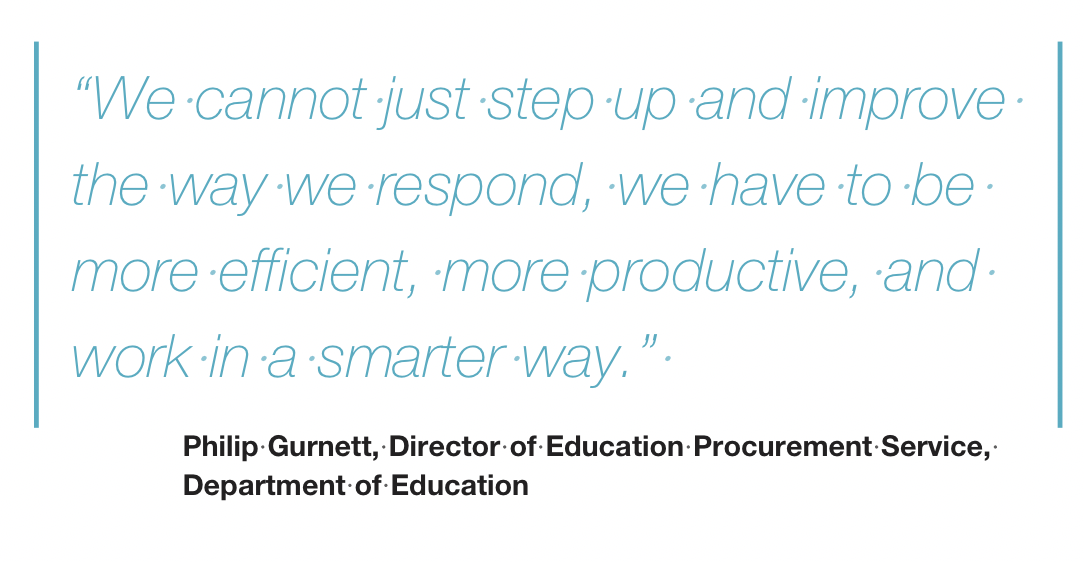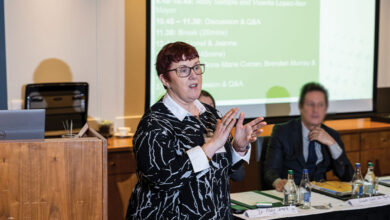Procurement in education

Philip Gurnett, Director of Education Procurement Service in the Department of Education, discusses the development, deployment, and value of multiannual procurement plans and centralised frameworks.
 Highlighting the significant strides made in securing forecasted savings, the Education Procurement Service (EPS) has achieved approximately €67 million to date through the implementation of the National Procurement Model in Education. Underpinning this success is the EPS Change Management Strategy, a testament to the diligent efforts in revolutionising procurement practices within the educational landscape.
Highlighting the significant strides made in securing forecasted savings, the Education Procurement Service (EPS) has achieved approximately €67 million to date through the implementation of the National Procurement Model in Education. Underpinning this success is the EPS Change Management Strategy, a testament to the diligent efforts in revolutionising procurement practices within the educational landscape.
Central to this transformation has been the meticulous implementation of the model across various educational institutions. Reflecting on this accomplishment, Gurnett elucidates how EPS conducted a strategic review, leading to the development of a comprehensive program aimed at further refining and delivering the core principles of the model.
Drawing inspiration from the Better Public Services strategy 2030, published by the Department of Public Expenditure, NDP Delivery and Reform in May 2023, EPS has embraced the overarching principle of digitisation to streamline processes and foster a culture of efficiency.
Amidst the diverse educational landscape encompassing universities, technological institutions, and primary/secondary schools, EPS endeavours to ensure adaptability in implementing change across sectoral partners. Gurnett emphasises the importance of collaboration and leveraging central frameworks wherever feasible to optimise procurement resources effectively.

A cornerstone of EPS’s strategy lies in Multiannual Procurement Plans (MAPPs), which serve as the linchpin of the supply chain model in education. These plans, completed by major institutions, facilitate comprehensive insights into procurement positions, foster engagement with central procurement bodies, and provide crucial reporting mechanisms.
Harnessing the wealth of data amassed through MAPPs, EPS facilitates seamless information exchange between educational sectors and the Office of Government Procurement (OGP), with a view to crafting future frameworks tailored to meet evolving needs comprehensively.
At the heart of EPS’s endeavours lies the development of an ecosystem fostering collaboration and innovation within procurement across educational and public sectors. Gurnett envisions this ecosystem as a catalyst for bottom-up procurement solutions, driven by enthusiastic engagement and shared experiences among stakeholders.
Despite notable achievements, Gurnett acknowledges persistent challenges, notably the significant portion of procurement expenditure managed at individual institution levels. Through ongoing analysis and engagement, EPS remains committed to enhancing the uptake of centralised procurement arrangements, thereby optimising resources, and maximising efficiency.
In light of the considerable procurement activities undertaken by institutions, it is crucial to assess how items will be categorised and sourced in the future. Analysis conducted by EPS reveals that a significant portion of expenditure is either tailored to the specific needs of education or constitutes a substantial portion of educational spending. Establishing a national framework solely for educational requirements becomes impractical due to this unique nature of expenditure. Consequently, the onus falls upon the education sector and EPS as the central procurement body to develop sector-specific arrangements for a significant portion of this procurement, thus aligning it with the central model.
Looking ahead, digitisation emerges as a pivotal strategy in elevating procurement processes, with 84 per cent of EPS’s strategic projects centred around digitisation initiatives. By embracing digital solutions such as e-delivery, analytics, and enhanced communication channels, EPS aims to revolutionise procurement practices in alignment with government policy.
In conclusion, Gurnett underscores the imperative of sustained innovation and efficiency in steering transformative change within the education procurement sector. Embracing a smarter, more productive approach is paramount in navigating the evolving landscape of procurement practices.





